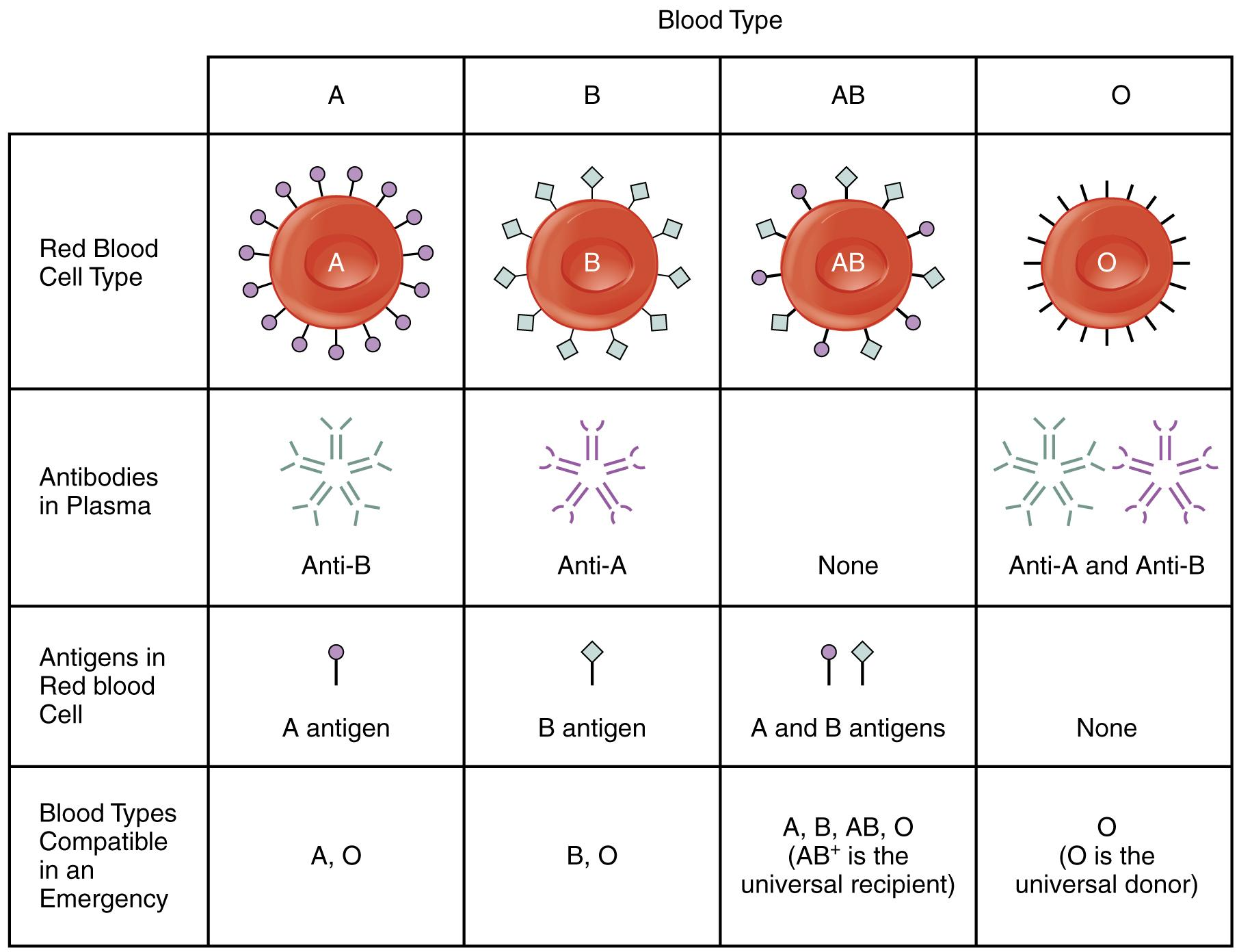
In the following table of human ABO groups, fill up the blanks (i), (ii), (iii) and (iv) from the options given below.
Blood group Antigens on RBCs Antibody in plasma Donor groups A A Anti-B A,O B B Anti-A B,O AB AB (ii) A,B,AB,O O (i) (iii) (iv)
(A) i – Nil, ii – Nil, iii – Anti-A, B, iv – AB
(B) i – Nil, ii – Nil, iii – Nil, iv – O
(C) i – Nil, ii – Anti-A ,B, iii – Nil, iv – O
(D) i – Nil, ii – Nil, iii – Anti-A, B, iv – O
| Blood group | Antigens on RBCs | Antibody in plasma | Donor groups |
| A | A | Anti-B | A,O |
| B | B | Anti-A | B,O |
| AB | AB | (ii) | A,B,AB,O |
| O | (i) | (iii) | (iv) |
Answer
572.1k+ views
Hint:-The ABO group in humans is a classification of the human blood group based on the antigens present on the red blood cells (RBC). The antigens present may be of glycolipids, proteins, carbohydrates or glycoproteins depending on the blood group.
Complete Answer:-

Karl Landsteiner discovered ABO blood groups in 1900. The mechanism involved in grouping is based on the antigens on RBCs and antibodies in the serum. All ABO blood groups have O-linked glycoproteins to which certain sugar residues that may or may not be attached. The sugar residue exposed helps in determining the blood group. As given in the table, blood group A has an antigen on RBC and anti-B antibody in plasma. Similarly, blood group B has the B antigens and anti-A antibody in plasma. However, blood groups AB and O are quite different.
AB group has both the antigens A and B on RBC but neither of their antibodies in the plasma.
Contrastingly, blood group O has neither of the neither A nor B antigens but has both anti-A and anti-B antibodies in their plasma.
The identification and grouping of different blood groups has its importance during blood transfusion and pregnancies. The antibodies in the plasma belong to the IgM antibody family. Hence, any mismatch in the blood group during transfusion of blood to the recipient will result in fatal immune reactions. Individuals with O blood group have both anti-A and anti-B antibodies. Therefore, they can donate blood to only individuals with O blood groups.
Thus, the correct answer is (D) i – Nil, ii – Nil, iii – Anti-A, B, iv – O.
Note:- Blood group O-negative is often called ‘universal donor’ as they do not have antigens. Similarly, AB-positive is called ‘universal recipient’ as they can receive red blood cells of any blood type.
Similarly, plasma can be donated and received. It is an inverse of RBC compatibility.
Complete Answer:-

Karl Landsteiner discovered ABO blood groups in 1900. The mechanism involved in grouping is based on the antigens on RBCs and antibodies in the serum. All ABO blood groups have O-linked glycoproteins to which certain sugar residues that may or may not be attached. The sugar residue exposed helps in determining the blood group. As given in the table, blood group A has an antigen on RBC and anti-B antibody in plasma. Similarly, blood group B has the B antigens and anti-A antibody in plasma. However, blood groups AB and O are quite different.
AB group has both the antigens A and B on RBC but neither of their antibodies in the plasma.
Contrastingly, blood group O has neither of the neither A nor B antigens but has both anti-A and anti-B antibodies in their plasma.
The identification and grouping of different blood groups has its importance during blood transfusion and pregnancies. The antibodies in the plasma belong to the IgM antibody family. Hence, any mismatch in the blood group during transfusion of blood to the recipient will result in fatal immune reactions. Individuals with O blood group have both anti-A and anti-B antibodies. Therefore, they can donate blood to only individuals with O blood groups.
Thus, the correct answer is (D) i – Nil, ii – Nil, iii – Anti-A, B, iv – O.
Note:- Blood group O-negative is often called ‘universal donor’ as they do not have antigens. Similarly, AB-positive is called ‘universal recipient’ as they can receive red blood cells of any blood type.
Similarly, plasma can be donated and received. It is an inverse of RBC compatibility.
Recently Updated Pages
Master Class 12 Economics: Engaging Questions & Answers for Success

Master Class 12 Physics: Engaging Questions & Answers for Success

Master Class 12 English: Engaging Questions & Answers for Success

Master Class 12 Social Science: Engaging Questions & Answers for Success

Master Class 12 Maths: Engaging Questions & Answers for Success

Master Class 12 Business Studies: Engaging Questions & Answers for Success

Trending doubts
Which are the Top 10 Largest Countries of the World?

What are the major means of transport Explain each class 12 social science CBSE

Draw a labelled sketch of the human eye class 12 physics CBSE

Why cannot DNA pass through cell membranes class 12 biology CBSE

Differentiate between insitu conservation and exsitu class 12 biology CBSE

Draw a neat and well labeled diagram of TS of ovary class 12 biology CBSE




